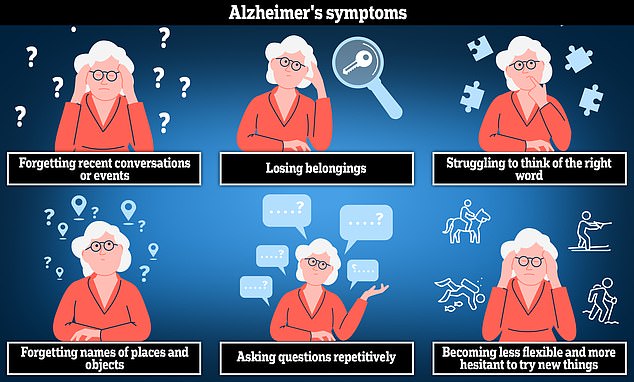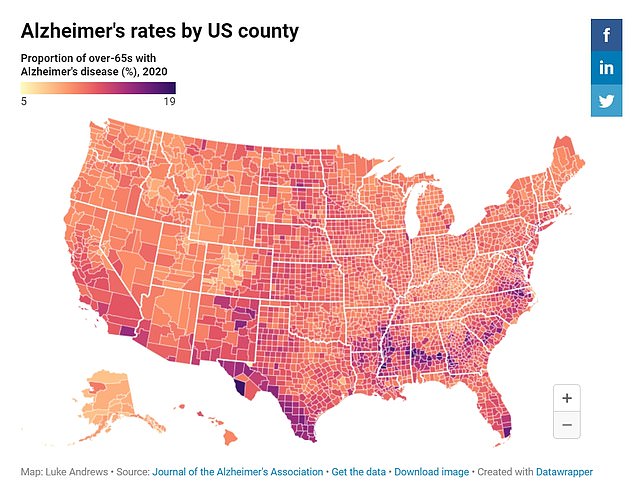Do you find yourself canceling midweek plans more often? This is why it can be an early sign of DEMENTIA




If you’re increasingly skipping social plans because you’re tired, it could be a sign that you’re at risk for dementia.
Research shows that older people who are sleepy during the day or lack enthusiasm for activities due to fatigue are at greater risk of developing a syndrome associated with Alzheimer’s disease.
The condition is called motor cognitive risk syndrome (MCR), and the authors suggest there could be a link between sleep problems.
People with the syndrome walk slowly and may have memory problems, but the new study suggests they may also suffer from daytime sleepiness, and as a result, a reduced desire to go out and do things like socialize.
The study’s lead author, Dr. Victoire Leroy of the Albert Einstein College of Medicine in the Bronx, New York, said: “There is potential that people can get help with their sleep problems and prevent cognitive decline later in life.”
People diagnosed with MCR are two times more likely to develop Alzheimer’s disease or vascular dementia than people without the syndrome.
The researchers from New York interviewed more than 400 people over 65 about their sleep quality and monitored them for three years.
They found that people with poor sleep and disinterest in their daily activities were three times as likely to develop MCR than people who slept well.

Alzheimer’s disease is the most common cause of dementia. In addition to changes in sleep and energy levels, some of the first signs include confusion, forgetfulness, and speech problems

According to research, approximately one in ten Americans over the age of 65 has some form of dementia Columbia University.
Certain forms of the disease, such as Alzheimer’s, are predicted to increase in the coming years, affecting an estimated 13 million Americans by 2050.
There is still a lot that researchers don’t understand about the cause of dementia.
But by finding out what some of the early signs of the disease are, researchers can better understand the disease and hopefully treat it.
One of those early signs is sleep disruption, according to the study, which was published in the American Academy of Neurology’s journal Neurology.
Study author Dr Leroy said: ‘Our findings highlight the need for screening for sleep problems.’
Dr. Leroy’s study included 445 people around the age of 76 who did not have dementia at the start of the screening.
Forty-two people had motor cognitive risk at the start of the study, but had yet to qualify for more serious conditions.
Each participant completed a survey about their sleep at the start of the study, with questions about their sleep quality, its duration and whether they had trouble staying awake during the day.
Over the course of the study, 36 people developed motor cognitive risk syndrome.
A third of people who had trouble staying awake during daily activities developed MCR, compared to just six percent of the rest of the participants.
After taking into account factors such as age, depression and other health risks, they found that people who had little enthusiasm for their daily activities and daytime sleepiness were three times as likely to develop the syndrome than people who had no sleep problems.

About one in ten Americans over the age of 65 currently has dementia. The Alzheimer’s Association estimates that certain forms of the disease are on the rise. Alzheimer’s disease is expected to grow to 13 million people by 2050
The study authors cautioned that their research had limitations. First, it only showed a link between sleep quality and MCR, it did not prove that poor sleep caused MCR.
Second, because their study included only a few hundred people, it needs to be redone to make sure it applies to everyone, Dr. Leroy said.
Dr. Leroy also added that since MCR was only identified in 2013, there is still a lot that scientists don’t understand about why it happens and how it can lead to dementia.
Older studies have suggested that poor sleep is one of the first signs of dementia. It is difficult to know whether it is a cause of dementia or a symptom of it.
Researchers from Harvard Medical School found that people who slept less than an hour per night were twice as likely to develop dementia than those who slept six to eight hours per night.
One theory, posited by Harvard Pilgrim Healthcare, is that if we don’t get enough sleep, our brains don’t have enough time to clear out the waste products they normally process during a long period of shut-eye.
This waste can then build up in the brain, dampening the cells and causing changes that build up over time.
Whatever the mechanism, health authorities are clear on their sleep advice: get as much as you can, as regularly as you can. According to the CDC, adults should get seven or more hours of sleep every day.




